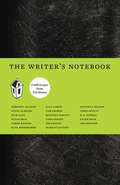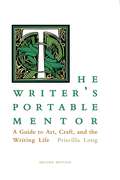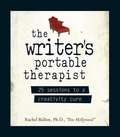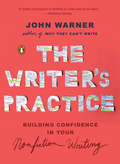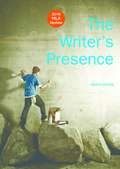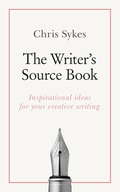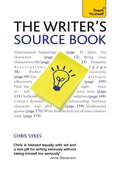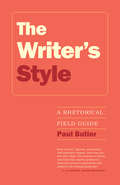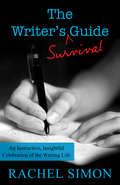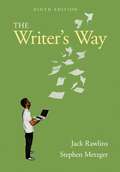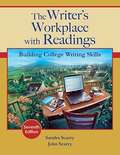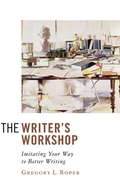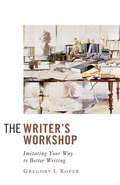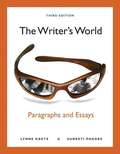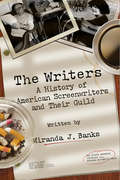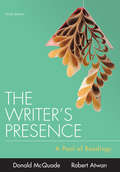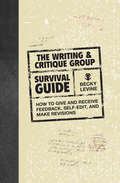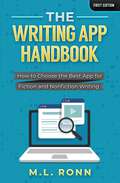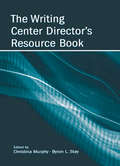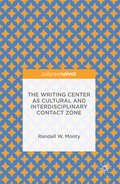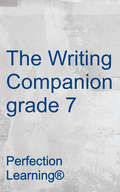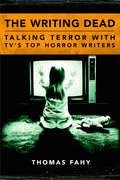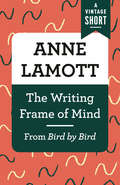- Table View
- List View
The Writer's Notebook II: Craft Essays from Tin House
by Francine Prose Christopher BehaThe Writer's Notebook II offers aspiring authors sixteen insightful essays about the craft of writing by Tin House authors and summer workshop faculty members, including Aimee Bender, Steve Almond, Maggie Nelson, Karen Russell, Benjamin Percy, and others. The Writer's Notebook II continues in the tradition of The Writer's Notebook, featuring essays based on craft seminars from the Tin House Summer Writer's Workshop, as well as a variety of craft essays from Tin House magazine contributors and Tin House Books authors. The collection includes essays that not only examine important craft aspects such as humor, suspense, and research but that also explore creating fractured and nonrealist narratives and the role of dream in fiction. An engaging and enlightening read, The Writer's Notebook II is both a toolkit and an inspiration for any writer. The Writer's Notebook II offers aspiring authors sixteen insightful essays about the craft of writing by Tin House authors and summer workshop faculty members, including Aimee Bender, Steve Almond, Maggie Nelson, Karen Russell, Benjamin Percy, and others.
The Writer's Portable Mentor: A Guide to Art, Craft, and the Writing Life, Second Edition
by Priscilla LongDesigned to mentor writers at all levels, from beginning to quite advanced, The Writer&’s Portable Mentor offers a wealth of insight and crafting models from the author&’s twenty-plus years of teaching and creative thought. The book provides tools for structuring a book, story, or essay. It trains writers in observation and in developing a poet&’s ear for sound in prose. It scrutinizes the sentence strategies of the masters and offers advice on how to publish. This second edition is updated to account for changes in the publishing industry and provides hundreds of new craft models to inspire, guide, and develop every writer&’s work.
The Writer's Portable Therapist
by Rachel BallonIn this inspiring, instructive little volume, noted therapist, author, and perfect muse Rachel "Doc Hollywood" Ballon, Ph. D. , sits on your shoulder whispering just the right thing at just the right time. Each chapter is a therapy session tackling a different aspect of the writing life-from conquering "page fright" and the perils/pleasures of solitude to tapping into your subconscious and nurturing the writer within. So, lie down on Dr. Rachel Ballon's couch, and send your creativity-and productivity-soaring! Book jacket.
The Writer's Practice: Building Confidence in Your Nonfiction Writing
by John WarnerFor anyone aiming to improve their skill as a writer, a revolutionary new approach to establishing robust writing practices inside and outside the classroomAfter a decade of teaching writing using the same methods he’d experienced as a student many years before, writer, editor, and educator John Warner realized he could do better. Drawing on his classroom experience and the most persuasive research in contemporary composition studies, he devised an innovative new framework: a step-by-step method that moves the student through a series of writing problems, an organic, bottom-up writing process that exposes and acculturates them to the ways writers work in the world. The time is right for this new and groundbreaking approach. The most popular books on composition take a formalistic view, utilizing “templates” in order to mimic the sorts of rhetorical moves academics make. While this is a valuable element of a writing education, there is room for something that speaks more broadly. The Writer’s Practice invites students and novice writers into an intellectually engaging, active learning process that prepares them for a wider range of academic and real-world writing and allows them to become invested and engaged in their own work.
The Writer's Presence: A Pool of Readings (Eighth Edition)
by Robert Atwan Donald McQuadeThe new edition of The Writer’s Presence collects teachable readings by great writers, showcasing distinctive voices and clear points of view on a broad range of engaging topics.
The Writer's Source Book: Inspirational ideas for your creative writing
by Chris SykesLEARN NEW AND INSPIRING WAYS OF LIFTING YOUR CREATIVE WRITING.Is your creative writing in need of inspiration? Do you need confidence to create watertight plots and believable characters?The Writer's Source Book provides dozens of practical exercises to help you create storylines, craft people and generate ideas, with support and creative insight for every stage.It will give you support in identifying your genre and crafting your work around it, and help you to understand the complexities of plot and character before beginning to create your own.Inspired and inspiring exercises will help you master the structure of your book, story or play, while focused and innovative advise will help those who have run into trouble. This is a technical manual ideal for any writer who needs to build, fix, polish or perfect their storyline.ABOUT THE SERIESThe Teach Yourself Creative Writing series helps aspiring authors tell their story. Covering a range of genres from science fiction and romantic novels, to illustrated children's books and comedy, this series is packed with advice, exercises and tips for unlocking creativity and improving your writing. And because we know how daunting the blank page can be, we set up the Just Write online community at tyjustwrite, for budding authors and successful writers to connect and share.
The Writer's Source Book: Teach Yourself
by Chris SykesIs your creative writing in need of inspiration? Do you need confidence to create watertight plots and believable characters?The Writer's Source Book provides dozens of practical exercises to help you create storylines, craft people and generate ideas, with support and creative insight for every stage.It will give you support in identifying your genre and crafting your work around it, and help you to understand the complexities of plot and character before beginning to create your own.Inspired and inspiring exercises will help you master the structure of your book, story or play, while focused and innovative advise will help those who have run into trouble. This is a technical manual ideal for any writer who needs to build, fix, polish or perfect their storyline.
The Writer's Style: A Rhetorical Field Guide
by Paul ButlerDesigned to help all writers learn to use style as a rhetorical tool, taking into account audience, purpose, context, and occasion, The Writer’s Style is not only a style guide for a new generation but a new generation of style guide. The book helps writers learn new strategies inductively, by looking at firsthand examples of how they operate rhetorically, as well as deductively, through careful explanations in the text. The work focuses on invention, allowing writers to develop their own style as they analyze writing from varied genres. In a departure from the deficiency model associated with other commonly used style guides, author Paul Butler encourages writers to see style as a malleable device to use for their own purposes rather than a domain of rules or privilege. He encourages writing instructors to present style as a practical, accessible, and rhetorical tool, working with models that connect to a broad range of writing situations—including traditional texts like essays, newspaper articles, and creative nonfiction as well as digital texts in the form of tweets, Facebook postings, texts, email, visual rhetoric, YouTube videos, and others. Though designed for use in first-year composition courses in which students are learning to write for various audiences, purposes, and contexts, The Writer’s Style is a richly layered work that will serve anyone considering how style applies to their professional, personal, creative, or academic writing.
The Writer's Survival Guide: An Instructive, Insightful Celebration of the Writing Life
by Rachel SimonThis inspirational guide for aspiring and experienced writers was originally published in 1997. Written in a friendly, hopeful, and gently humorous tone, it focuses on the creative process and emotional ups and downs of the creative life, providing insights into how to persist in the face of rejection, frustration, feelings of inadequacy, lack of support from loved ones, and more. It also offers practical how-to advice, from organizing your time so you actually sit down and write to reading as a writer. This ebook's rerelease of The Writer's Survival Guide includes a new introduction that discusses the origins of the book and how, in spite of the many changes in publishing and technology, it remains relevant today.
The Writer's Way
by Jack Rawlins Stephen MetzgerThe spirit of THE WRITER'S WAY remains in the ninth edition, as do its two core principles: (1) good writing begins when writers know their audience and write for the right reasons; and (2) knowing their audience and having good reasons to write will teach users everything they need to know about technique. Based on a “whole language approach,” THE WRITER'S WAY is a dynamic, process-centered paperback rhetoric with readings. While this book is intended to be used in a classroom, it's very much based on the concept that there is little difference between writing in school and writing in the “real world.” Offering frank advice in a supportive, encouraging tone, the authors lead readers step by step through the writing process, from pre-writing to polishing the final draft.
The Writer's Workout
by Christina KatzThe inspiration, stamina, and power to take charge of your writing life'every day. Get the daily jolt of energy your writing life needs fromThe Writer's Workout. Inside you'll find manageable, no-nonsense techniques for every aspect of your writing career from getting organized to connecting with your audience to building relationships. Veteran writing coach Christina Katz draws on her knowledge from more than a decade in the business to give you tips, exercises, and insider strategies to build your skills. Make your writing as strong and powerful as possible. Pitch and sell your work at every opportunity. Overcome rejection to come back better than ever. Promote your work and build an audience. Learn how to balance your creative life with your daily life. WithThe Writer's Workout, you'll develop skill, strength, and confidence ? everything you need to build a robust, unique writing career that's built to last. Bonus online exclusive: Download a free motivational poster to keep you moving as your build your writing career at writersdigest. com/writers-workout.
The Writer's Workout
by Christina KatzThe inspiration, stamina, and power to take charge of your writing life--every day.Get the daily jolt of energy your writing life needs from The Writer's Workout. Inside you'll find manageable, no-nonsense techniques for every aspect of your writing career from getting organized to connecting with your audience to building relationships.Veteran writing coach Christina Katz draws on her knowledge from more than a decade in the business to give you tips, exercises, and insider strategies to build your skills.Make your writing as strong and powerful as possible.Pitch and sell your work at every opportunity.Overcome rejection to come back better than ever.Promote your work and build an audience.Learn how to balance your creative life with your daily life.With The Writer's Workout, you'll develop skill, strength, and confidence - everything you need to build a robust, unique writing career that's built to last.Bonus online exclusive: Download a free motivational poster to keep you moving as your build your writing career at writersdigest.com/writers-workout.
The Writer's Workplace with Readings: Building College Writing Skills (7th Edition)
by Sandra Scarry John ScarryFor more than 20 years, THE WRITER'S WORKPLACE has served the needs of more than half a million two- and four-year students as they have worked their way toward rewarding careers in a variety of fields. Sandra Scarry and John Scarry present writing instruction in a clear and inviting form, with step-by-step explanations to help build and maintain students' confidence in their writing. The result of many years of classroom teaching and research, this comprehensive and time-tested resource reflects the authors' understanding that students are unique individuals, with diverse backgrounds and interests that must be accounted for as they engage in the writing process.
The Writer's Workshop: Imitating Your Way to Better Writing
by Gregory L. RoperThe Writer’s Workshop takes an approach to teaching writing that is new only because it is so old. Today, rhetoric and composition typically proceed by ignoring what was done for 2,500 years in Western education. Gregory Roper, on the other hand, helps students learn to write in the way the great writers of the past themselves learned: by carefully imitating masters of the craft, including Cicero, Thomas Aquinas, Charles Dickens, Sojourner Truth, James Joyce, and Ernest Hemingway. By living in their workshops and apprenticing to these and other masters, apprentice writers—like apprentice musicians, painters, and blacksmiths of the past—will rapidly improve the complexity of their art and discover their own native voices.Interspersed into chapters full of sound practical advice and challenging assignments are reflections on Great Ideas from “Realism and Impressionism” to “Nominalism and Modern Science.” Perfect for the college or even high school writing classroom—as well as a marvelous book for homeschoolers and others who would like to improve their own writing—The Writer’s Workshop is a fine practical guide, and Dr. Roper a friendly yet demanding teacher-mentor.
The Writer's Workshop: Imitating Your Way to Better Writing
by Gregory L. RoperThe Writer's Workshop takes an approach to teaching writing that is new only because it is so old. Today, rhetoric and composition typically proceed by ignoring what was done for 2,500 years in Western education. Gregory Roper, on the other hand, helps students learn to write in the way the great writers of the past themselves learned: by carefully imitating masters of the craft, including Cicero, Thomas Aquinas, Charles Dickens, Sojourner Truth, James Joyce, and Ernest Hemingway. By living in their workshops and apprenticing to these and other masters, apprentice writers—like apprentice musicians, painters, and blacksmiths of the past—will rapidly improve the complexity of their art and discover their own native voices. Interspersed into chapters full of sound practical advice and challenging assignments are reflections on Great Ideas from "Realism and Impressionism" to "Nominalism and Modern Science." Perfect for the college or even high school writing classroom—as well as a marvelous book for homeschoolers and others who would like to improve their own writing—The Writer's Workshop is a fine practical guide, and Dr. Roper a friendly yet demanding teacher-mentor.
The Writer's World: Paragraphs and Essays (3rd Edition)
by Lynne Gaetz Suneeti PhadkeThe Writer's World series was written to address the diverse needs of today's students: students whose first language is not English, students who respond favorably to visuals, and students who have varying skill levels.
The Writers
by Miranda J. BanksScreenwriters are storytellers and dream builders. They forge new worlds and beings, bringing them to life through storylines and idiosyncratic details. Yet up until now, no one has told the story of these creative and indispensable artists. The Writers is the only comprehensive qualitative analysis of the history of writers and writing in the film, television, and streaming media industries in America. Featuring in-depth interviews with over fifty writers--including Mel Brooks, Norman Lear, Carl Reiner, and Frank Pierson--The Writers delivers a compelling, behind-the-scenes look at the role and rights of writers in Hollywood and New York over the past century. Granted unprecedented access to the archives of the Writers Guild Foundation, Miranda J. Banks also mines over 100 never-before-published oral histories with legends such as Nora Ephron and Ring Lardner Jr., whose insight and humor provide a window onto the enduring priorities, policies, and practices of the Writers Guild.With an ear for the language of storytellers, Banks deftly analyzes watershed moments in the industry: the advent of sound, World War II, the blacklist, ascension of television, the American New Wave, the rise and fall of VHS and DVD, and the boom of streaming media. The Writers spans historical and contemporary moments, and draws upon American cultural history, film and television scholarship and the passionate politics of labor and management. Published on the sixtieth anniversary of the formation of the Writers Guild of America, this book tells the story of the triumphs and struggles of these vociferous and contentious hero-makers.
The Writer’s Presence
by Robert Atwan Donald McQuadeMemorable. Provocative. Timely. Luminous. The Writer's Presence brings together the best of the essay genre in a teachable, flexible compendium, because great reading inspires great academic writing. Edited by Best American Essays series editor Robert Atwan and composition teacher and scholar Donald McQuade, The Writer's Presence offers a rich pool of readings you'll enjoy dipping into. The essays here address topics students care about, from race in America to transgender identity, with careful attention to voice, tone, and figurative language. Classic authors like Langston Hughes and George Orwell join rising stars like Roxane Gay and Eula Biss for a grand tour of masterful writing. Divided into three parts--personal writing, expository writing, and argumentative writing--The Writer's Presence also provides practical strategies for student writers, giving them tools to sharpen their own voices and imagination. An e-book option offers even greater flexibility and convenience.
The Writing & Critique Group Survival Guide: How to Make Revisions, Self-Edit, and Give and Receive Feedback
by Becky LevineTrying to Finish Your Book? There's Strength in Numbers Whether you're trying to revise your novel or polish up an article to pitch to magazines, it pays to have a few sets of eyes look over your work. But, how can you be sure you're getting an unbiased and objective opinion? A writing critique group may be the answer you're looking for, and this book arms you with everything you need to find a group that suits your specific writing needs. Whether you're looking to join an existing group or start one of your own, you'll learn how to: Find compatible critique partners Develop your "editor's eye" and analyze writing like a professional Construct organized and well thought-out critiques Give and receive constructive feedback Run efficient critique meetings and maintain a good group dynamic Apply the feedback you receive to your own writing and make revisions Complete with worksheets, sample critiques and examples,The Writing & Critique Group Survival Guidegives you tools to hone your editing skills and deepen your understanding of how to revise your own work as well as someone else's. With the help of this guide your writing critique group can be a helpful resource for you and your writing partners for years to come.
The Writing App Handbook: How to Choose the Best App for Fiction and Nonfiction Writing (Author Level Up #11)
by M.L. RonnHow's your writing app working out for you lately? If you're reading this, then you're dissatisfied with your current writing software and want something better. After all, your time is too valuable to waste fighting with an app that doesn't love you back. The RIGHT writing app will make you twice as productive and help you write more books in less time. You’ll be able to write more books than you ever dreamed of. In this guide, prolific author M.L. Ronn will cover the top features of the hottest writing apps on the market to help you choose the best fit for your writer personality. You'll discover: How the right writing app can boost your word counts and reduce typos in your books How to avoid wasting money on the wrong writing app (buy it nice or buy it twice!!) Apps that are better than OpenOffice, MS Word, and Google Docs: 100% guaranteed 35+ helpful features that writers are using to crush their novels A free tool that can help you pick the best writing app in a few clicks Don't settle for the wrong fit. Buy the Writing App Handbook to meet your perfect writing app today! V1.0
The Writing Center Director's Resource Book
by Christina Murphy Byron L. StayThe Writing Center Director's Resource Book has been developed to serve as a guide to writing center professionals in carrying out their various roles, duties, and responsibilities. It is a resource for those whose jobs not only encompass a wide range of tasks but also require a broad knowledge of multiple issues.The volume provides information on the most significant areas of writing center work that writing center professionals--both new and seasoned--are likely to encounter. It is structured for use in diverse institutional settings, providing both current knowledge as well as case studies of specific settings that represent the types of challenges and possible outcomes writing center professionals may experience. This blend of theory with actual practice provides a multi-dimensional view of writing center work.In the end, this book serves not only as a resource but also as a guide to future directions for the writing center, which will continue to evolve in response to a myriad of new challenges that will lie ahead.
The Writing Center as Cultural and Interdisciplinary Contact Zone
by Randall W. MontyWriting centers are complex. They are places of scholarly work, spaces of interdisciplinary interaction, and programs of service, among other things. With this complexity in mind, this book theorizes writing center studies as a function of its own rhetorical and discursive practices. In other words, the things we do and make define who we are and what we value. Through a comprehensive methodological framework grounded in critical discourse analysis, this book takes a closer look at prominent writing center discourses by temporarily shifting attention away from the stakeholders, work, locations, and scholarship of the discipline, and onto things--the artifacts and networks that make up the discipline. Through this approach, we can see the ways the discipline reinforces, challenges, reproduces, and subverts structures of institutional power. As a result, writing center studies can be seen a vast ecosystem of interconnectivity and intertextuality.
The Writing Dead: Talking Terror with TV'S Top Horror Writers (Television Conversations Series)
by Thomas FahyThe Writing Dead features original interviews with the writers of today's most frightening and fascinating shows. They include some of television's biggest names—Carlton Cuse (Lost and Bates Motel), Bryan Fuller (Hannibal, Dead Like Me, Wonderfalls, and Pushing Daisies), David Greenwalt (Angel and Grimm), Gale Anne Hurd (The Walking Dead, The Terminator series, Aliens, and The Abyss), Jane Espenson (Buffy the Vampire Slayer and Battlestar Galactica), Brian McGreevy (Hemlock Grove), Alexander Woo (True Blood), James Wong (The X-Files, Millennium, American Horror Story, and Final Destination), Frank Spotnitz (The X-Files and Millennium), Richard Hatem (Supernatural, The Dead Zone, and The Mothman Prophecies), Scott Buck (Dexter), Anna Fricke (Being Human), and Jim Dunn (Haven). The Writing Dead features thought-provoking, never-before-published interviews with these top writers and gives the creators an opportunity to delve more deeply into the subject of television horror than anything found online. In addition to revealing behind-the-scene glimpses, these writers discuss favorite characters and storylines and talk about what they find most frightening. They offer insights into the writing process reflecting on the scary works that influenced their careers. And they reveal their own personal fascinations with the genre. The thirteen interviews in The Writing Dead also mirror the changing landscape of horror on TV—from the shows produced by major networks and cable channels to shows made exclusively for online streaming services such as Netflix and Amazon Studios. The Writing Dead will appeal to numerous fans of these shows, to horror fans, to aspiring writers and filmmakers, and to anyone who wants to learn more about why we like being scared.
The Writing Frame of Mind: From Bird by Bird (A Vintage Short)
by Anne LamottA Vintage Shorts selection. To the enormous challenges of being a writer, Anne Lamott offers invaluable advice and encouragement, which more than a million scribes and scribblers of all ages and abilities have been inspired by for a quarter century. In this selection from her essential volume, Bird by Bird, Lamott tenderly recommends and outlines the qualities that every writer should learn to hone: intuition, attention, morality, and more. An ebook short.
